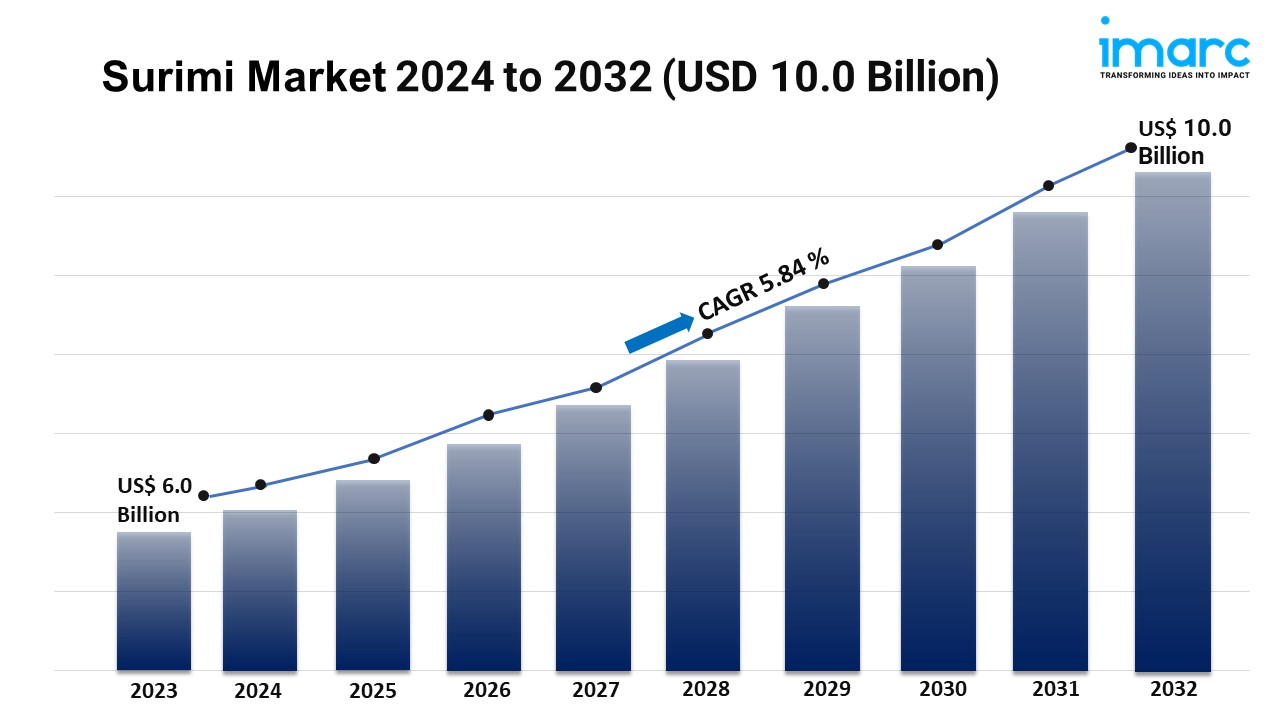Surimi Market 2024 | Size, Trends, Forecast and Analysis 2032
- by sujeet123
- August 30, 2024
IMARC Group's report titled "Surimi Market by Packaging (Chilled or Fresh, Source), Source (Alaska Pollock, Pacific Whiting, Silver Carp and Others), Distribution Channel (Direct Sales, Retail Sales, Supermarkets and Hypermarkets, Online Retails, Wet Market), and Region 2024-2032", The global surimi market size reached US$ 6.0 Billion in 2023. Looking forward, IMARC Group expects the market to reach US$ 10.0 Billion by 2032, exhibiting a growth rate (CAGR) of 5.84% during 2024-2032.
For an in-depth analysis, you can refer sample copy of the report: https://www.imarcgroup.com/surimi-market/requestsample
Factors Affecting the Growth of the Surimi Industry:
- Innovations in Product Development:
Key players are introducing a wide range of innovative surimi-based products to cater to diverse consumer preferences and dietary requirements. These include imitation crab sticks, surimi-based seafood blends, crab-flavored snacks, and surimi-based seafood analogs. By offering a variety of product options, manufacturers can appeal to a broader consumer base and capture new market segments. Furthermore, ongoing innovations in processing techniques and ingredient formulations is leading to improvements in the taste, texture, and overall quality of surimi products.
- Increasing Demand for Seafood Products:
Surimi serves as a versatile and cost-effective alternative protein source. As the global population is growing and dietary preferences are shifting towards healthier options, there is a rising demand for protein-rich food products. Surimi, being a seafood product with high protein content, fulfills this demand and caters as per consumers seeking nutritious alternatives to traditional meat products. Moreover, surimi-based products, such as imitation crab sticks and seafood blends, are widely available in supermarkets, grocery stores, and restaurants. This accessibility makes it easier for consumers to incorporate seafood into their meals without the need for extensive preparation or specialized cooking skills.
- Expansion of Distribution Channels:
The expansion of distribution channels allows surimi products to reach a wide audience, including domestic and international markets. By partnering with distributors, wholesalers, retailers, and food service providers, surimi manufacturers can tap into new geographic regions and target diverse consumer demographics, thereby expanding their market reach and driving sales growth. In addition, key players leverage various distribution channels, including supermarkets, hypermarkets, specialty food stores, convenience stores, online retailers, and food service establishments, to increase the visibility of their products. Through strategic placement and marketing initiatives, such as product displays, promotions, and advertising campaigns, manufacturers can raise awareness and generate interest in surimi among consumers.
Leading Companies Operating in the Global Surimi Industry:
- American Seafoods Group
- Apitoon Group
- Aquamar Inc (Lm Foods LLC)
- Gadre Marine Pvt. Ltd.
- Glacier Fish Company LLC
- Ocean Food Company Ltd.
- OceanFood Sales Ltd.
- Pacific Seafood Group
- Russian Fishery Company LLC
- Seaprimexco Vietnam
- Thong Siek Global
- Trident Seafoods Corporation
- Viciunai Group
Explore full report with table of contents: https://www.imarcgroup.com/surimi-market
Surimi Market Report Segmentation:
By Packaging:
- Chilled or Fresh
- Source
Chilled or fresh represents the largest segment due to its superior quality and freshness, which appeals to consumers seeking high-quality seafood products.
By Source:
- Alaska Pollock
- Pacific Whiting
- Silver Carp and Others
Alaska pollock accounts for the majority of the market share as it possesses desirable qualities for surimi production, such as its firm texture, mild flavor, and white flesh.
By Distribution Channel:
- Direct Sales
- Retail Sales
- Supermarkets and Hypermarkets
- Online Retails
- Wet Market
Direct sales hold the biggest market share owing to their extensive reach, wide product selection, and competitive pricing.
Regional Insights:
- North America (United States, Canada)
- Asia Pacific (China, Japan, India, South Korea, Australia, Indonesia, Others)
- Europe (Germany, France, United Kingdom, Italy, Spain, Russia, Others)
- Latin America (Brazil, Mexico, Others)
- Middle East and Africa
Asia Pacific dominates the market, driven by the growing seafood consumption and increasing production capacity of surimi in the region.
Global Surimi Market Trends:
Key players are introducing pre-cooked and pre-packaged surimi-based snacks, salads, sushi rolls, and sandwiches, catering to consumers busy lifestyles and on-the-go eating habits. These convenient options offer consumers a quick and hassle-free way to enjoy surimi without the need for extensive preparation or cooking, thereby bolstering the growth of the market.
Additionally, with the growing popularity of plant-based diets and the increasing demand for vegetarian and vegan alternatives, some manufacturers are developing plant-based surimi alternatives using ingredients, such as soy protein, pea protein, and konjac. These plant-based surimi products offer a sustainable and animal-friendly option for consumers looking to reduce their consumption of animal products while still enjoying the taste and texture of surimi.
Note: If you need specific information that is not currently within the scope of the report, we will provide it to you as a part of the customization.
About Us:
IMARC Group is a leading market research company that offers management strategy and market research worldwide. We partner with clients in all sectors and regions to identify their highest-value opportunities, address their most critical challenges, and transform their businesses.
IMARCs information products include major market, scientific, economic and technological developments for business leaders in pharmaceutical, industrial, and high technology organizations. Market forecasts and industry analysis for biotechnology, advanced materials, pharmaceuticals, food and beverage, travel and tourism, nanotechnology and novel processing methods are at the top of the companys expertise.
Our offerings include comprehensive market intelligence in the form of research reports, production cost reports, feasibility studies, and consulting services. Our team, which includes experienced researchers and analysts from various industries, is dedicated to providing high-quality data and insights to our clientele, ranging from small and medium businesses to Fortune 1000 corporations.
Contact US
IMARC Group
134 N 4th St. Brooklyn, NY 11249, USA
Email: sales@imarcgroup.com
Tel No:(D) +91 120 433 0800
United States: +1-631-791-1145 | United Kingdom: +44-753-713-2163


